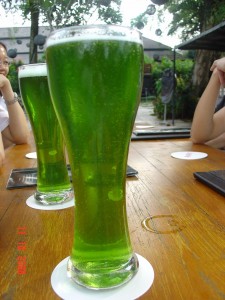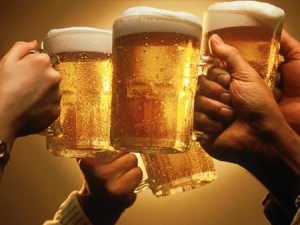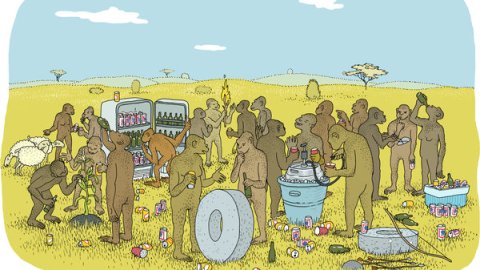This is a sort of ode to all those people celebrating their non-Irish heritage by drinking green beer tonight. St. Patrick’s Day, just another excuse for people to get drunk……in Costa Rica the locals and most expats seem to find a reason to do this almost very day. Human beings are social animals. But just as important, we are socially constrained as well.
 We can probably thank the latter trait for keeping our fledgling species alive at the dawn of man. Five core social instincts, I have argued, gave structure and strength to our primeval herds. They kept us safely codependent with our fellow clan members, assigned us a rank in the pecking order, made sure we all did our chores, discouraged us from offending others, and removed us from this social coil when we became a drag on shared resources.
We can probably thank the latter trait for keeping our fledgling species alive at the dawn of man. Five core social instincts, I have argued, gave structure and strength to our primeval herds. They kept us safely codependent with our fellow clan members, assigned us a rank in the pecking order, made sure we all did our chores, discouraged us from offending others, and removed us from this social coil when we became a drag on shared resources.
Thus could our ancient forebears cooperate, prosper, multiply — and pass along their DNA to later generations.
But then, these same lifesaving social instincts didn’t readily lend themselves to exploration, artistic expression, romance, inventiveness and experimentation — the other human drives that make for a vibrant civilization.
To free up those, we needed something that would suppress the rigid social codes that kept our clans safe and alive. We needed something that, on occasion, would let us break free from our biological herd imperative — or at least let us suppress our angst when we did.
We needed beer.
Luckily, from time to time, our ancestors, like other animals, would run across fermented fruit or grain and sample it. How this accidental discovery evolved into the first keg party, of course, is still unknown. But evolve it did, perhaps as early as 10,000 years ago.
Current theory has it that grain was first domesticated for food. But since the 1950s, many scholars have found circumstantial evidence that supports the idea that some early humans grew and stored grain for beer, even before they cultivated it for bread.
Brian Hayden and colleagues at Simon Fraser University in Canada provide new support for this theory in an article published this month (and online last year) in the Journal of Archeological Method and Theory. Examining potential beer-brewing tools in archaeological remains from the Natufian culture in the Eastern Mediterranean, the team concludes that “brewing of beer was an important aspect of feasting and society in the Late Epipaleolithic” era.
published this month (and online last year) in the Journal of Archeological Method and Theory. Examining potential beer-brewing tools in archaeological remains from the Natufian culture in the Eastern Mediterranean, the team concludes that “brewing of beer was an important aspect of feasting and society in the Late Epipaleolithic” era.
Anthropological studies in Mexico suggest a similar conclusion: there, the ancestral grass of modern maize, teosinte, was well suited for making beer — but was much less so for making corn flour for bread or tortillas. It took generations for Mexican farmers to domesticate this grass into maize, which then became a staple of the local diet.
Once the effects of these early brews were discovered, the value of beer (as well as wine and other fermented potions) must have become immediately apparent. With the help of the new psychopharmacological brew, humans could quell the angst of defying those herd instincts. Conversations around the campfire, no doubt, took on a new dimension: the painfully shy, their angst suddenly quelled, could now speak their minds.
But the alcohol would have had more far-ranging effects, too, reducing the strong herd instincts to maintain a rigid social structure. In time, humans became more expansive in their thinking, as well as more collaborative and creative. A night of modest tippling may have ushered in these feelings of freedom — though, the morning after, instincts to conform and submit would have kicked back in to restore the social order.
Some evidence suggests that these early brews (or wines) were also considered aids in deliberation. In long ago Germany and Persia, collective decisions of state were made after a few warm ones, then double-checked when sober. Elsewhere, they did it the other way around.
Beer was thought to be so important in many bygone civilizations that the Code of Urukagina, often cited as the first legal code, even prescribed it as a central unit of payment and penance.
Part of beer’s virtue in ancient times was that its alcohol content would have been sharply limited. As far as the research has shown, distillation of alcohol to higher concentrations began only about 2,000 years ago.
Today, many people drink too much because they have more than average social anxiety or panic anxiety to quell — disorders that may result, in fact, from those primeval herd instincts kicking into overdrive. But getting drunk, unfortunately, only compounds the problem: it can lead to decivilizing behaviors and encounters, and harm the body over time. For those with anxiety and depressive disorders, indeed, there are much safer and more effective drugs than alcohol — and together with psychotherapy, these newfangled improvements on beer can ease the angst.
But beer’s place in the development of civilization deserves at least a raising of the glass. As the ever rational Ben Franklin supposedly said, “Beer is living proof that God loves us and wants us to be happy.”
Several thousand years before Franklin, I’m guessing, some Neolithic fellow probably made the same toast.
By Jeffrey P. Kahn, New York Times

